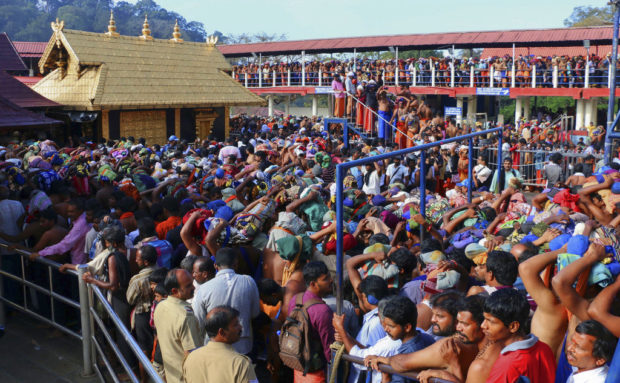Indian temple priests turn back women of menstruating age, defy court ruling

In this Dec. 1, 2015 file photo, Hindu worshippers stand in queues outside the Sabarimala temple, one of the world’s largest Hindu pilgrimage sites, in the southern Indian state of Kerala. India’s ruling party and the main opposition are both supporting a protest to keep females of menstruating age from entering the temple, in what some political observers say is a bid to shore up votes ahead of next year’s general election. The country’s Supreme Court had on Sept. 28, 2018, lifted the temple’s ban on women of menstruating age, holding that equality is supreme irrespective of age and gender. (AP Photo/ Hareesh Kumar A S, File)
NEW DELHI — Dozens of Hindu priests on Friday joined conservative protesters to block women of menstruating age from one of the world’s largest Hindu pilgrimage sites, defying a ruling from India’s top court to let them enter.
The priests threatened to stop rituals and prayers in hillock Sabarimala temple in southern Kerala state if women ages 10-50 tried to enter the shrine.
“We have decided to lock the temple and hand over the keys and leave. I stand with the devotees. I do not have any other option” said Kandararu Rajeevaru, the head priest of Sabarimala temple.
Two young women, a journalist and an activist, were forced to turn back after they had reached the temple precincts under a heavy police escort.
Kadakampalli Surendran, a Kerala state minister, said the temple was not a place for activism and to prove a point and the government was not responsible for providing security to activists.
Article continues after this advertisementThe minister’s statement came despite the state government, run by the Communist Party of India (Marxist), vowing to implement the Supreme Court’s ruling.
Article continues after this advertisementHundreds of protesters have blocked the entry of women of menstruating age since the temple reopened on Wednesday after the Supreme Court’s ruling three weeks ago holding that equality is supreme irrespective of age and gender.
The temple will remain open for five-day monthly prayers until October 22.
Protesters vowed to file a petition with the Supreme Court next week seeking a review of its ruling of September 28 allowing all women entry into the temple. They said the celibacy of the temple’s presiding deity, Lord Ayyappa, is protected by India’s Constitution, and that women of all ages can worship at other Hindu temples. Some Hindu figures consider menstruating women to be impure.
The entry of females between the ages of 10 and 50 to the centuries-old temple was banned informally for many years, and then by law in 1972.
In 1991, the Kerala High Court confirmed the ban. India’s Supreme Court lifted the ban last month, holding that equality is supreme irrespective of age and gender. /kga